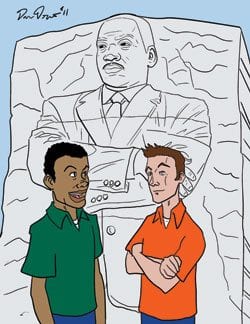
| “It’s up to us to make the dream come true.” |
A nation’s symbols help to inspire patriotism. The addition of the Martin Luther King Jr. Memorial to the National Mall in Washington, D.C. has created a trilogy of great patriots. The King Memorial is located along an axis between the Jefferson and Lincoln Memorials. Each of these great Americans has helped to define the nation’s creed.
Jefferson will long be remembered for his language in the 1776 Declaration of Independence:
We hold these truths to be self-evident, that all men are created equal, that they are endowed by their Creator with certain unalienable Rights, that among these are Life, Liberty and the pursuit of Happiness.
In his Gettysburg Address on Nov. 19, 1863 to honor those who gave their lives to preserve the union, Lincoln said:
The world will little note, nor long remember what we say here, but it can never forget what they did here. It is for us the living, rather, to be dedicated here to the … great task remaining before us — that from these honored dead we take increased devotion to that cause for which they gave the last full measure of devotion — that we here highly resolve that these dead shall not have died in vain — that this nation, under God, shall have a new birth of freedom — and that government of the people, by the people, for the people, shall not perish from the earth.
One hundred years later on Aug. 28, 1963, in his “I Have a Dream” speech from the Lincoln Memorial in Washington, D.C., Martin Luther King Jr. raised the issue that while slavery has been ended blacks are still “… sadly crippled by the manacles of segregation and the chains of discrimination.”
King said:
In a sense we have come to our nation’s capital to cash a check. When the architects of our republic wrote the magnificent words of the Constitution and the Declaration of Independence, they were signing a promissory note to which every American was to fall heir. This note was a promise that all men … would be guaranteed the unalienable rights of life, liberty and the pursuit of happiness.
In his historic speech, King declared that “instead of honoring this sacred obligation, America has given the Negro people a bad check … which has come back marked ‘insufficient funds.’ ” Despite efforts to right this wrong in “… the fierce urgency of now,” King advised that “We must forever conduct our struggle on the high plane of dignity and discipline,” and “… must rise to the majestic heights of meeting physical force with soul force.”
Despite the persistence of racial discrimination King declared, “I still have a dream. It is a dream deeply rooted in the American Dream. I have a dream that one day this nation will rise up and live out the true meaning of its creed.”
Indeed, no individual in the 20th century has been more effective than Martin Luther King in keeping the dream alive. It is quite appropriate for him to have a memorial on the National Mall and along the same axis as the memorials of the keepers of the dream from the 18th and 19th centuries, Thomas Jefferson and Abraham Lincoln.






